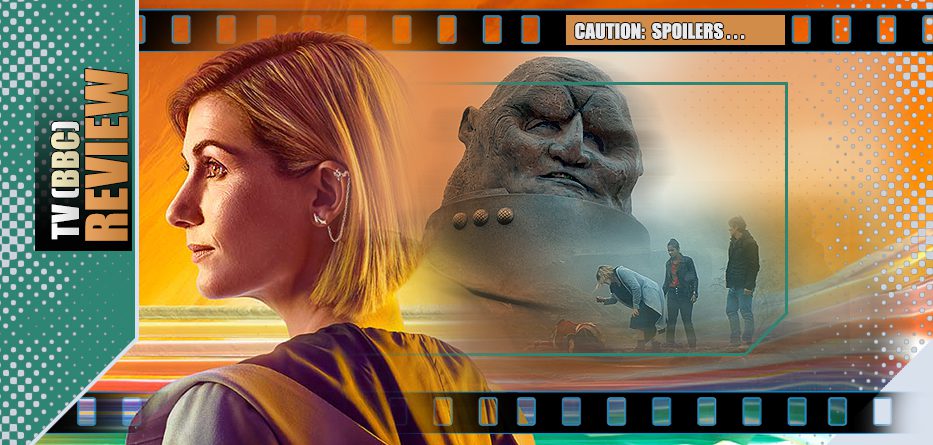The Flux has engulfed the Tardis, but rather than it being the end of everything, The Doctor finds herself having a vision of a house that should not exist and then wakes on a battlefield. Yaz and Dan are there, but soon find themselves further displaced in time. Unable to reenter the Tardis, the Doctor finds herself stranded in the Crimean War, but rather than the British facing Russian troops, the opposing army comes from much further away.
The Sontarans might not be responsible for The Flux, but they are happy to take advantage of it and, for once, time is not on the Doctor’s side as she attempts to rejoin her ‘Fam’… but her enemies have other plans…
*spoilers*
So. Where were we? If you watched last week’s episode and took note of statistics, you could still proclaim anything you wanted. Naysayers will rightly point out that it was the lowest audience numbers for season-opener in a long time and way down from Who’s most recent heyday. Others, more inclined to look through Rose Tyler coloured glasses, will point out, also correctly, that it was broadcast on Halloween, at an hour when kids and parents were likely out trick or treating and that the episode still got the second-highest ratings of the day behind Strictly Ballroom and was in the week’s Top Ten.
In short, the infinite space within the Tardis is both half-full and half-empty – either way, the physical Tardis itself appears to be in bad shape.
This is the second episode in a six-part story and it’s interesting that almost everything involving the Doctor is technically a diversionary side-story – perhaps pointing to the fact that the plans for the 2021 episodes had to be reworked because of COVID. The Sontarans, the major force of the episode as the title suggests, are actually nothing to do with the major threat of the mini-series, The Flux, they just opportunistically took the chance to launch a major offensive in the microseconds before the Lupari / Karvanista set up the barrier to protect Earth – all due to their convenient psychics predicting the event. Their battle-plans, while fun to experience, raise serious and basic questions about the internal logic at work. Mounting ‘simultaneous’ (all things being relative?) across the time-stream would seem contradictory and would raise so many paradoxes that abject failure seems the only rational outcome (in short: if the Sontarans are using the 21st century as a staging post, wouldn’t a success in the past in the Crimea, leave contemporary Earth looking very different than the ‘just arrived a couple of days ago’ fleet we see?). The way in which the Doctor and Dan communicate across the ships network also seems awfully contrived in execution and should have at least had some technobabble to explain it.
The story in the Crimea is basically a commentary on the military attitude of the time and there are moments when it works – the Doctor’s look of palpable horror at the waste of life she hasn’t been able to stop because of the determination of commanders to see the battle through (which it is, in all too brief CGI and glimpsed from a distance). But the potential impact is further muted by a) the fact that there’s so much damage to the time-stream that one presumes will need to be put right before we’re done – otherwise the history books and maps are redundant – so the soldiers who lost their lives against the Sontarans feel less temporal tragedies and more temporary window-dressing that will be reset and b) that General Logan’s(Gerald Kyd) decision to blow up the retreating Sontaran ships is almost a direct lift from Tennant’s memorable debut episode where Penelope Wilton’s Prime Minister made the same decision. If Whittaker’s Doctor had muttered something about ‘Doesn’t he look tired?‘ I might well have hurled something at the screen.
The titular Flux is referenced but is largely kept at a distance throughout. Last week it was the universe-crunching, planet-eating cloud of chaos that was destroying everything in its path like a cosmic tidal-wave. In the last moments of the first episode it struck and hit the Tardis, but rather than foreshortening the mini-series and for some *because* internal reasoning, the Doctor, Yaz and Dan are perfectly okay, merely waking up next to the Tardis in the Crimea of the 1800s. Sure the Tardis seems to have had its doors blocked off (and we later see some internal bumps and bruises) but otherwise not blown to pieces… but it’s as if the Flux is whatever Chibnall wants it to be for the episode, rather than a consistent threat. Equally, Dan and Yaz are immediately lifted out of the Crimea setting by the Doctor suddenly surmising a ‘collision between Flux and Vortex energy’ though its blatantly for story rather than logic purposes – which makes one wonder why the script had them arrive with her at all. Dan finds himself back home in contemporary Liverpool – albeit one with an alien-occupied / resistance Journey’s End feel. However, Yaz appears in a strange temple on a planet that may or may not be called ‘Time’. Why? Again…because.
Jacob Anderson as Vinder is fine but we know so little about him and with the disconnect from the rest of the stories so far, he essentially just has to turn up, meet Yaz and say some lines. There were rumours that John Barrowman would return for this season but given the change in production (and Barrowman’s own tribulations in the press) that didn’t happen. But it feels like Captain Jack could have filled the same space without the same exposition and background that Vinder sorely needs to make him notable.
The Swarm and Azure appear in boo-hiss fashion. Swarm continues to stride around and sounds like a cross between The Vision and the Red Skull and cuts a certain dash in crystal/steampunk outfit and theatrical manner while his sister Azure tends to look less convincing – essentially she’s been attacked by glitter and a glow-stick. They feel like scenery-chewing villains from the 1970s/1980s era of the show, but given a better budget and sense of consequence, though – once again – their actual history and motives will be the deciding factor whether they become classic adversaries or disposable despots. They are, so far, a guilty pleasure, but it could still go either way. Episodic guest-star Sara Powell as Mary Seacole is good, though The Doctor knowing who she is, within seconds of their meeting, seems like useful exposition (everyone else will likely have to dip into the history books). We also have a quick meeting with Steve Oram as the real-life 1800s architect Joseph Williamson…. inhabiting the role well but hopefully we’ll see more of him soon.
There’s no sign or mention of Dan’s beau Diane but there is an inexplicable new henchperson on hand called Passenger (coincidence?). The set-decorators have earned their wages and the humour generally lands well (as well as multiple sly Star Wars references. even discounting that Sontarans fire with Stormtrooper accuracy) and this the most old-school (in style) Who that Chibnall’s been in a while and that will please some.
There’s legitimate grumbles to be had at the connective tissue and handwavery plotting, though that’s been an established ‘style’ for a while now, but that’s not to say that – so far – Flux isn’t relatively fun in the moment, with so many things happening that it’s hard to form a cohesive opinion until it settles. It could be, as noted in last week’s review, that Flux is a mini-series jigsaw in which we’re looking at random pieces and with no picture on the box yet to materialise – and that when complete it will be a work of stunning majesty and blueprinting. Certainly the events seemingly happening out of order for some of the players leads us to Moffaty-levels of scope. And, to be fair, it’s only going to be on completion that we can judge it. But in a week-to-week reviewing process given the elements provided, Flux feels more like a set of deep-dive concepts and familiar tribute-act plot-points (spot the references) given first-draft-scripted screen-time (so much could be better scripted or connected) the frayed seams and leaps of logic hidden by pacing and spectacle. Whittaker is giving it her all given the material and is in better form than the opportunities she’s had so far.
It’s likely you’ll be grading on a curve – one of the better episodes of the recent era but hardly as cohesive as it needs to be.
- Story7
- Acting7
- Direction7











